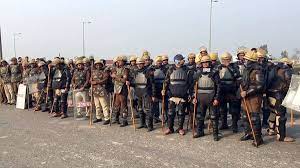NEW DELHI: As the ongoing standoff between farmers and the government persists, all eyes will be on the second round of talks this evening. The invite for dialogue comes as a last-ditch effort by the Centre to appease Samyukt Kisan Morcha (non-political) leaders on the eve of their scheduled “Dilli Chalo” march.
Scores of farmers’ unions, led by the SKM (non-political) and Kisan Mazdoor Morcha, have threatened to hold the ‘Dilli Chalo’ march on February 13 over their demand for comprehensive reforms, including legislation to guarantee minimum support price (MSP).
The Samyukt Kisan Morcha (SKM), an umbrella body of 40 farm unions which led the 2020-21 agitation, is not participating in the February 13 protest but has called for a nationwide “Grameen Bandh” on February 16.
Despite the government’s attempt at dialogue, the substantial deployment of security forces along the Capital borders underscores its preparedness to manage any potential escalation if negotiations prove unsuccessful. The elaborate preparations and deployment by Haryana and Delhi police send out the message that the government is unlikely to concede all demands put forth by the farmers. Farm leaders have announced their intent to attend the meeting with Union Ministers, including Arjun Munda, Piyush Goyal, and Nityanand Rai, in Chandigarh at 5 pm on Monday. However, the farmers emphasised that they would proceed as planned if the government failed to accept their demands during the meeting.
Sarvan Singh Pandher, general secretary of Punjab Kisan Mazdoor Sangharsh Committee and coordinator of KMM, affirmed that farmers were prepared to hold the protest if the talks failed.
The heavy police deployment along NH-44, a crucial highway connecting Haryana, Punjab, Himachal Pradesh, Jammu and Kashmir and Chandigarh to New Delhi, raises concerns about potential disruptions. Approximately 60,000 vehicles traverse this highway daily, and any disturbances could impact commuters and the supply of essential items to the Capital.
The Delhi and Haryana police are making elaborate security arrangements to prevent farmers from seizing control of NH-44. The Haryana Police have been monitoring the movement of farmers, implementing measures such as placing boulders on the Shambhu border, the main entry point from Punjab to Haryana.
Delhi Police Commissioner Sanjay Arora inspected arrangements at Tikri and Singhu borders, the epicentre of the year-long farmers’ protest in 2020-21. Internal assessments by the Delhi Police estimate that 15,000 to 20,000 farmers on 2,000 to 2,500 tractors might reach Delhi to participate in the march, with participation expected from farm unions from several states.
The initial meeting between farmers and Union ministers did yield some positive results, with the government agreeing to certain demands. However, farmers remain steadfast in their demand for comprehensive reforms, including legislation to guarantee MSP, a comprehensive loan waiver, and the implementation of Swaminathan Commission recommendations for fair remuneration and sustainable agricultural practices.


